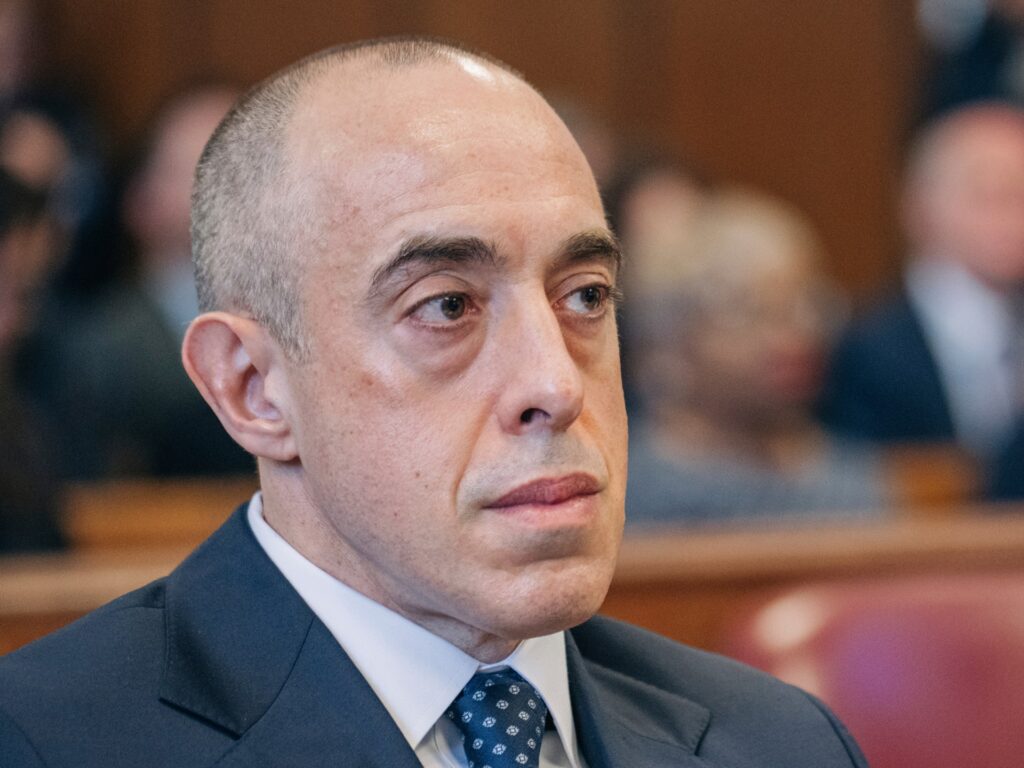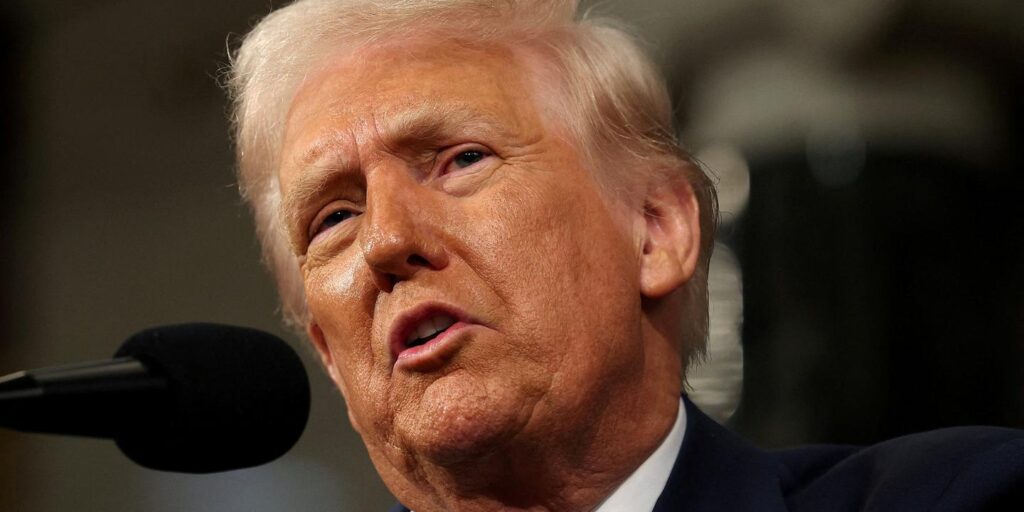A former lawyer with the United States Department of Justice (DOJ) has published a whistleblower complaint accusing officials of intentionally ignoring court orders that might impede US President Donald Trump’s campaign for mass deportation.
On Tuesday, representatives for Erez Reuveni filed a 35-page letter of complaint detailing the lawyer’s allegations against the Trump administration.
It offers a look at the debates and divisions unfolding behind the scenes at the Justice Department, as it defends Trump’s efforts to arrest and rapidly deport non-citizens, a process that has spurred concern about rights violations.
Members of the Trump administration have “engaged in unlawful activity, abused their authority, (and) created substantial and specific threat to health and safety”, according to the letter.
As a result, it says, “Mr Reuveni is exercising his rights … to report wrongdoing”.
The letter was addressed to members of Congress, as well as the inspector general for the Justice Department, who investigates allegations of misconduct within the bureau. Reuveni was ultimately fired in April.
One administration official who features prominently in his allegations is Emil Bove, who formerly served as Trump’s personal lawyer. Bove helped to defend Trump against criminal charges last year in New York, where he was found guilty of 34 counts of falsifying business documents.
Trump has since named Bove to be part of his administration in his second term as president. For the first three months of Trump’s term, Bove was acting attorney general at the Justice Department. And this week, he faces a Senate confirmation hearing for his nomination to join the US Third Circuit Court of Appeals as a judge.
Scrutiny on deportation flights
One incident allegedly occurred on March 14, when Trump was weighing whether to use a wartime law — the Alien Enemies Act of 1798 — to pave the way for expedited removals from the country.
According to Reuveni’s account, Bove told Justice Department lawyers that Trump would soon sign an order to invoke the law, which had only been used three times in US history, all during periods of war.
Bove added that planes would imminently take off, deporting individuals under the law’s authority.
But as Reuveni recalled, Bove anticipated pushback from the courts. He said that Bove “stressed to all in attendance that the planes needed to take off no matter what” and that the Justice Department “would need to consider telling the courts ‘f*** you’”.
The room fell silent, according to Reuveni, who observed “awkward, nervous glances” among his colleagues.
“Mr Reuveni was stunned by Bove’s statement because, to Mr Reuveni’s knowledge, no one in DOJ leadership — in any Administration — had ever suggested the Department of Justice could blatantly ignore court orders, especially with a ‘f*** you’,” the complaint said.
It added that the Justice Department typically advises its government clients to follow court orders, not ignore them.
The very next day, on March 15, the government’s use of the Alien Enemies Act was challenged in a US district court in Washington, DC, led by Judge James Boasberg.
When questioned by Boasberg, a high-ranking Justice Department lawyer denied knowing whether any deportation flights were taking off imminently. In his complaint, Reuveni said that statement was false.
Later that day, Boasberg issued a court injunction that barred any removals under the Alien Enemies Act and required any US planes carrying out such deportations to return to the country.
Reuveni said he emailed the Department of Homeland Security and the Department of State multiple times in the hours afterwards to ensure they complied with Boasberg’s order. But he said he received no reply.
The flights ultimately landed in El Salvador, where hundreds of deported immigrants were sent to a prison called the Terrorism Confinement Centre or CECOT.
“Mr Reuveni anticipated that the government would be held in contempt of court for deplaning those on the flight,” the complaint reads.
Boasberg has since indicated that he has found probable cause for contempt on the part of the Trump administration, though an appeals court has temporarily paused proceedings on the matter.
Inside the Abrego Garcia case
In a second instance detailed in the complaint, Reuveni said he tried to alert the Trump administration that it may be in violation of another court injunction — only to be “told to stop asking questions”.
Further, Reuveni alleged that he received advice to “communicate by phone only where possible”, presumably to avoid leaving a paper trail.
A third episode outlined in the complaint sheds light on Reuveni’s participation in the high-profile case of Kilmar Abrego Garcia, a Salvadoran man who had a protection order allowing him to remain in the US.
Abrego Garcia was nevertheless deported on March 15, in what officials admitted was an “administrative error”.
The Trump administration has nevertheless defended its actions by accusing Abrego Garcia of membership in a gang, MS-13.
Despite a court order, upheld by the Supreme Court, to “facilitate” Abrego Garcia’s return, the Trump administration left him in Salvadoran custody for more than two months. Only on June 6 did it return him to the US, on the premise that he would face criminal charges for human trafficking.
In the complaint, Reuveni said that, at first, he thought Abrego Garcia’s return to the US would be “straightforward”.
But then he said he was stonewalled and told to “cease making requests” and “stop asking for facts supporting any possible defence of the case”. He was also discouraged from making “asks” of El Salvador’s government.
Reuveni later made headlines for conceding in court that Abrego Garcia should not have been removed from the country. He also said he did not have “satisfactory” answers for questions from the judge in the case, Paula Xinis.
That incident was perceived as a black eye for the Trump administration.
Behind closed doors, Reuveni’s boss asked him why he did not accuse Abrego Garcia of being “a member of a terrorist organisation” during the court hearing, according to the complaint. Reuveni said he responded that the government had not provided evidence or submitted briefs to support that argument.
When the Trump administration circulated an appeal on April 4 advancing those arguments, Reuveni reportedly said he could not sign it because the allegations “were not supported by law or the record”.
“Mr Reuveni responded, ‘I didn’t sign up to lie,’” the complaint said.
Professional fallout
By April 11, Reuveni was fired from his position with the Justice Department, after nearly 15 years of service.
Attorney General Pam Bondi issued a statement at the time accusing him of failing to “zealously advocate on behalf of the United States”, as is expected of a government lawyer. But Reuveni’s complaint disputes that accusation.
“Discouraging clients from engaging in illegal conduct is an important part of the role of lawyer,” it reads. “Mr Reuveni tried to do so and was thwarted, threatened, fired and publicly disparaged for both doing his job and telling the truth to the court.”
The complaint notes that Reuveni had previously received “stellar” evaluations for his work on immigration policy, including during Trump’s first term.
Still, as the news of the complaint circulated on US media, members of the Trump administration sought to frame Reuveni’s claims as those of a “disgruntled former employee”.
“I was at the meeting described in the article and at no time did anyone suggest a court order should not be followed,” said Deputy Attorney General Todd Blanche in a statement on social media.
He accused Reuveni and media outlets like The New York Times, which published a copy of Reuveni’s complaint, of attempting to sabotage Bove’s chances of being confirmed as a circuit court judge.
“This is disgusting journalism,” he wrote. “Planting a false hit piece the day before a confirmation hearing is something we have come to expect from the media, but it does not mean it should be tolerated.”
Democrats, meanwhile, seized the complaint as evidence of malfeasance in the Trump administration.
“Emil Bove has no respect for the rule of law and court orders. He does not belong on the federal bench,” Senator Cory Booker wrote on social media.
Senator Dick Durbin, meanwhile, released a statement praising Reuveni for coming forward as a whistleblower. He said the Senate had an obligation to act on the “serious allegations” raised about Bove.
“I want to thank Mr Reuveni for exercising his right to speak up and bring accountability to Mr Bove,” Durbin wrote. “And I implore my Senate Republican colleagues: do not turn a blind eye to the dire consequences of confirming Mr Bove to a lifetime position as a circuit court judge.”


